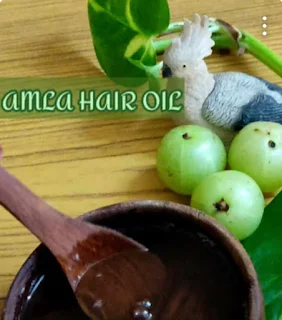Amla hair oil, Dabur amla hair oil -
Read & Share
Amla oil is derived & extracted from amla fruit, is also known as Nepali gooseberry (Emblica in scientific name), that is known as for its use as Ayurvedic medicine.
Amla oil is generally made of by drying the fruit and soaking it in a base oil such as mineral oil. It is actually grown in tropical and subtropical countries like Nepal, India, China, Pakistan, Uzbekistan, Sri Lanka, Indonesia and Malaysia.
Amla oil is identified to promote hair growth and prevent baldness or hair fall. However, there is not enough scientific evidence to support this claim. Amla oil is usually applied directly on the scalp or consumed orally or massaged on the skins.
This article discusses the purported uses of amla oil, its side effects, and precautions to take when considering this supplement.
Dietary supplements are not regulated like drugs in the United States, meaning that the Food and Drug Administration (FDA) does not approve products for safety and efficacy before they are marketed. Whenever possible, choose a supplement that has been tested by a trusted third party such as USP, Consumer Lab, or NSF.
However, even if supplements are third-party tested, that doesn't mean they're safe for everyone or generally effective. Therefore, it is important to talk to your healthcare provider about any supplement you plan to take and check for possible interactions with other supplements or medications.
The supposed use of amla oil. Supplement use should be reviewed individually and by a health care professional, such as a registered dietitian, pharmacist, or health care provider. Any supplement is intended to treat, cure or prevent disease.
Research on the potential health benefits of amla oil is limited. While Amla fruit has undergone laboratory and animal studies for cardiovascular disease, metabolic syndrome (a group of diseases that can lead to stroke, heart disease, and diabetes), cancer, and gastrointestinal disorders, and antibacterial and antimicrobial properties for some health conditions. Properties (destroying the growth of bacteria or viruses) — There is insufficient evidence to support its use for any of these conditions due to a lack of human research. 1 More research is needed.
Hair loss
Androgenic alopecia is characterized by progressive hair loss from the top and front of the scalp. Although it is often referred to as male pattern hair loss, the condition can affect people of any sex and gender.
Amla oil has been used for centuries in Ayurvedic medicine (an alternative medicine that is part of India's traditional medical system) to help nourish hair and promote a healthy scalp. However, there is limited research on the use of amla oil for hair care. There are some studies that suggest it can help with hair loss, but these were mainly conducted in laboratories and not in the human population.
For example, one study examined 17 plants commonly used for hair treatments. Amla oil extract was shown to be the second strongest inhibitor of 5-alpha-reductase, an enzyme that can cause baldness.











